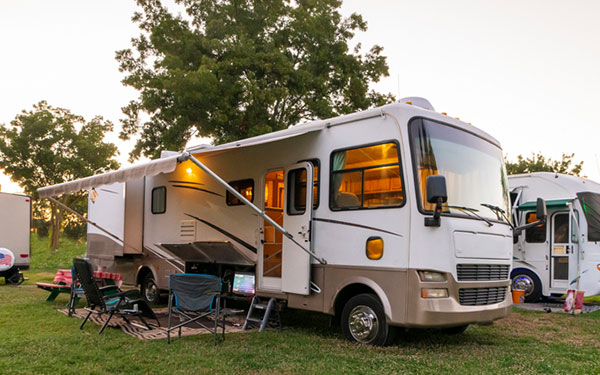When it comes to RVing, having the right gear is essential. Adapting to different situations while on the road is key to ensuring a smooth trip. Whether it’s a trusted GPS or a go-to flashlight, every RVer has an item they wouldn’t drive a mile without. But for new RVers, it’s often difficult to determine which gadgets you genuinely need, and which are just excessive.
To help new RVers prepare for their first trip, we compiled our list of the top recommended RV accessories. Of course, this list isn’t exhaustive, but it should provide you with the basic necessities (plus a few extras) for any trip.
The Top RV Accessories for New RVers
1. Wheel Chocks
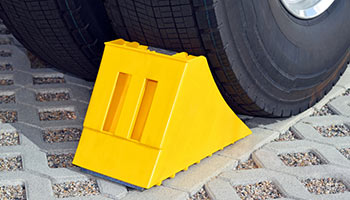
Any RV needs to have a reliable set of wheel chocks. Wheel chocks are wedges designed to stop a vehicle from accidentally rolling or moving when stationary. While parking brakes work well to ensure your rig remains stable, having an additional layer of protection will provide maximum safety. When parked on a slope or in a strong storm, wheel chocks are absolutely essential. For added security, we recommend you chock both sides of your RV.
2. A Portable Surge Protector
A common misconception is that all campsite power outlets are identical. This is simply not true. A surge protector is a must-have RV accessory that will prevent costly damage to your RV’s electrical system. Having a surge protector establishes a buffer between a campsite’s power outlet and your RV. If possible, consider purchasing an electrical management system (EMS) for your RV as it protects against both power spikes and dips.
3. Freshwater Hose
When packing your RV accessories, a freshwater hose is one you don’t want to forget. RV freshwater hoses differ from garden hoses because they are BPA and lead-free, making them suitable for drinking water. As a convenience, most RV freshwater hoses are either white or blue to help you differentiate them from any other hoses you may have. Always purchase a 30ft to 50ft long hose to reach any water connections that aren’t located near your RV.
4. Portable Solar Panels
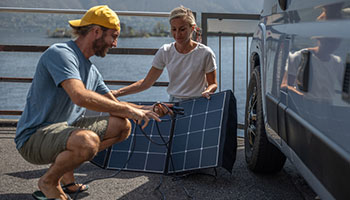
Solar panels are a must-have RV accessory if you prefer boondocking over campground stays. Of course, you can permanently mount solar panels on the roof of your RV, but portable panels offer some additional benefits.
For example, if it’s a hot day and you want to park in the shade, portable panels allow you to place the panels in direct sunlight while the shade keeps your RV cool. With this method, you can routinely reposition the panels as the sunlight changes throughout the day.
5. Two-Way Radios
The joys of RVing include visiting some of the country’s most remote, scenic locations. Because your adventures will often take you away from cell reception, it’s essential to have a pair of two-way radios on hand. Whether it’s maintaining communication on a hike or keeping track of your children at the campground, there are lots of reasons to have a pair of two-way radios in your RV. For example, we found it easier to use our radios when backing into a campsite instead of solely relying on hand signals in the mirror.
6. Leveling Blocks
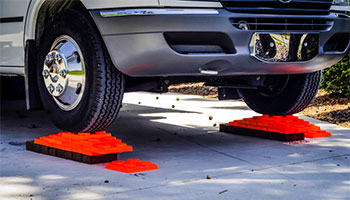
In an ideal world, every parking space is perfectly flat. But, unfortunately, even most paved campsites aren’t always level.
If your rig doesn’t have a built-in leveling system, always include leveling blocks in your list of must-have RV accessories. If your rig isn’t leveled, there will be added stress on the frame—which could lead to damages.
7. Power Cord Adapters
Most RVs typically come with either 30-amp or 50-amp power plugs. If you have a 50-amp RV, you may have noticed that most RV parks only have 30-amp service capabilities. Having RV power cord adapters will enable you to convert RV plugs to match any electrical service outlet. Often referred to as “dog bones,” these adapters will make it possible to use electronics while at a campsite. While it is possible to hook a 50-amp RV to a 30-amp pedestal, always be mindful and limit your usage of high-voltage electronics to prevent a circuit trip.
8. RV GPS
You may be wondering why we included a GPS in our list of must-have RV accessories when most mobile phones have built-in GPS. While Google Maps works great for getting to the office, it doesn’t always provide the ideal route for an RV. Therefore, we recommend investing in an RV-specific GPS. With an RV GPS, you can input your RV’s specific dimensions to avoid potentially hazardous routes.
9. Tire Pressure Monitoring System
No matter your experience, every RVer should have a tire pressure monitoring system (TPMS). With a TPMS installed, you’ll be alerted whenever there’s a sudden change in pressure (or temperature) in any of your tires. Although it sounds strange, you may not know that a tire is losing pressure when traveling in an RV. Installing a TPMS will allow you to prevent unnecessary damage to your rims and RV if you have a leaking tire.
10. A Tool Bag
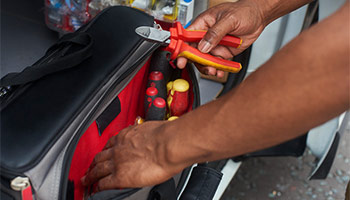
We recommend always having a bag of basic tools in your RV. While some RV accessories will keep your RV in operational order, it’s always nice to have a screwdriver around when you need to fix a busted camp chair.
To assemble your tool bag, start with the basics: duct tape, screwdriver (Phillips and flat-head), a wrench set, and pliers. Then, slowly add to the bag as you see fit as time goes on.
Protect Your RV With RV Insurance
No RV accessory will protect your RV the way having RV Insurance will. We recommend obtaining an RV policy that is separate from your auto insurance policy to protect your RV in the event of an accident. To speak with one of our RV Insurance Specialists, give us a call today at (866) 501-7335.
The information in this article is obtained from various sources and is offered for educational purposes. Furthermore, it should not replace manuals or instructions provided by the manufacturer or the advice of a qualified professional. No warranty or appropriateness for a specific purpose is expressed or implied.
